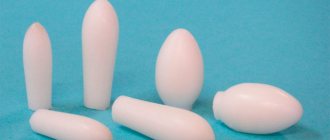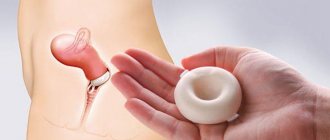To prevent unwanted pregnancy, many women use contraceptive suppositories. They are second in effectiveness only to combined oral contraceptives. When using them, protection against unwanted pregnancy is guaranteed by 85%. To ensure that the effectiveness of the product does not decrease, you must follow the instructions for use. Before choosing a contraceptive drug, you should consult your doctor.
What are contraceptive suppositories called?
It is impossible to name a universal remedy that would suit all women without exception. Each body reacts differently to different types of vaginal tablets and suppositories. Therefore, the drug should be selected individually.
The most common non-hormonal contraceptive suppositories include the following:
- Erotex;
- Benatex;
- Pharmatex;
- Nonoxynol;
- Patentex Oval.
The active ingredient in the first three names of suppositories is benzalkonium chloride. The active component of the last two varieties is nonxinol-9. As a result of the action of these substances, vaginal mucus becomes more viscous, which impedes the movement of sperm and prevents fertilization of the egg.
Advantages and disadvantages of vaginal contraceptive suppositories
Like any other medications, vaginal contraceptives have their advantages and disadvantages. They are recommended for women who are not sexually active. To achieve the best result, you should follow the storage conditions and rules for administering suppositories.
The advantages of candles include the following factors:
- Effective lubrication. When a woman does not produce enough lubrication, she may experience discomfort during intercourse. The use of suppositories will compensate for unpleasant symptoms.
- Protection against sexually transmitted diseases. Although the main purpose of contraceptives is to prevent unwanted pregnancy, they can provide some protection against bacteria and viruses.
- No systemic effect on the body. Non-hormonal contraceptives act locally, are not absorbed into the blood and do not affect the menstrual cycle.
- Availability for use during pregnancy and lactation.
- Possibility of use as additional protection when skipping birth control pills.
Before using candles, you need to familiarize yourself with their disadvantages:
- Negative effect on vaginal microflora. With the systematic use of suppositories, some patients experience dysbacteriosis, as well as inflammation of the vagina and cervix.
- The presence of contraindications, such as cervical erosion, inflammatory processes in the vagina, individual intolerance.
- The need to use suppositories in strict accordance with the instructions.
Also, when choosing suppositories for women as contraceptives, you should remember that one suppository is designed for only one sexual contact. Before administration, you should not use soap and products containing alkalis for intimate hygiene, since when interacting with them, the effectiveness of the drug sharply decreases.
Which is better: suppositories or birth control pills?
To find out which type of contraception is best for a particular woman, it is important to consult a doctor. It is worth considering that the use of birth control pills requires regularity. If the dosage regimen is not followed, they will not provide the expected protection.
Important! The effectiveness of birth control suppositories is approximately 85%. Here they are inferior to hormonal contraceptives, the effectiveness of which, according to researchers, reaches 91%.
The choice of contraceptives depends on how active the patient’s sex life is. Another determining factor is pregnancy and lactation. Unlike oral hormonal contraceptives, suppositories do not have a systemic effect on the body. Therefore, they can be used by pregnant women and nursing mothers.
The best contraceptive suppositories
Gynecologists recommend suppositories with a contraceptive effect, which they prescribe to their patients more often than others. These include:
- Patentex Oval with gelatin - immobilizes sperm, preventing their contact with the egg. The harmless drug produces foam, which prevents sperm from penetrating into the uterus. Contraindications to the use of the product are colpitis, cervicitis, and vaginal bleeding.
- Nonoxynol is an effective, inexpensive suppository that deprives sperm of activity and prevents conception. It is contraindicated to use them in case of adnexal inflammation or the presence of cervical erosion.
- Gynekotex are suppositories that do not provoke hormonal changes and do not contribute to vaginal dysbiosis. The remedy prevents conception, but has contraindications in the form of erosion or inflammation of the uterus. A possible side effect of the drug is contact dermatitis.
Articles on the topic
- Birth control pills for breastfeeding - list of medications with annotations and prices
- Regulon - instructions for use, indications, dosage, contraindications and reviews
- Jess Plus - instructions for use, contraindications, side effects, mechanism of action and analogues
Benatex
Benatex suppositories contain alkylbenzyldimethylammonium chloride hydrobromide as an active component. Suppositories are well tolerated, do not leak from the vagina during sexual intercourse, and do not lead to itching. The non-hormonal drug does not cause side effects or problems with libido, and does not have an unpleasant odor.
Some women complain that the product may leak after sex, which makes them want to wash themselves. Suppositories should be administered 5–8 minutes before sexual intercourse. Contraindications to the use of Benatex are:
- colpitis;
- hypersensitivity to the components of the composition;
- the presence of ulcers, irritations, damage to the mucous membrane of the vagina or uterus.
Benzalkonium chloride
Suppositories based on benzalkonium chloride have spermicidal and antiseptic activity. The bactericidal effect of the drug is manifested against staphylococci, Klebsiella, streptococci, Pseudomonas aeruginosa and Escherichia coli, Proteus, chlamydia, herpes type 2, gonorrhea, Trichomonas. The product has no effect on mycoplasmas and weakly on gardnerella, Ducray's bacillus, fungi of the genus Candida and treponema.
Benzalkonium chloride does not affect the vaginal microflora; it can be combined with an intrauterine device, barrier condoms, or if you miss taking birth control pills. The suppositories are administered five minutes before sex and last for four hours. Side effects of the product are contact dermatitis, candidiasis, vulvovaginitis, contraindications - hypersensitivity to the component, acids.
Pharmatex
Pharmatex post-coital suppositories, according to the manufacturer, are excellent for women who are breastfeeding. The suppositories contain a strong spermicide and antiseptic components that prevent the development of sexually transmitted infections. The drug has no side effects, except hypersensitivity to the components, it does not affect the quality of lactation and is completely safe for the child.
Suppositories are inserted into the vagina 5-8 minutes before sex and are effective for 4 hours. When sexual intercourse is repeated, they are inserted again. After sex, suppositories leak from the vagina, but they cannot be washed off with soap, so as not to neutralize the contraceptive effect. Hygiene of the genital organs and cavities is carried out 2 hours before and after insertion of the suppository. Possible side effects are fever, weakness, aching bones; suppositories can damage the mucous membrane when dissolved.
According to reviews from patients who use Pharmatex, the advantages include the almost complete absence of contraindications, affordable price and small size, absence of a strong odor, additional vaginal lubrication and elimination of dryness. Among the disadvantages, the inconvenience of opening the package, the slow flow of residues from the vagina and periodic burning sensations in both partners as a result of increased sensitivity are indicated.
Erotex
Erotex suppositories are allowed after abortion, during lactation, and intolerance to hormonal contraception. The drug has no contraindications, except for individual intolerance, it is safe for the microflora of the vagina and mucous membrane. The product has a four-hour effect. The candles have a pleasant aroma, do not cause unpleasant sensations, and contain benzalkonium chloride as an active component. The downside of suppositories is that patients call the fatty membrane, which dissolves and flows out of the vagina, staining the partner’s skin and bed/underwear.
Sterilin
A vaginal drug based on nonoxynol helps to successfully protect against unwanted conception and exhibit antifungal and antimicrobial effects. Sterilin suppositories are prescribed for therapeutic purposes to eliminate genitourinary infections. Contraindications to the use of suppositories are individual intolerance to the components, pregnancy or suspicion of it.
The suppository is inserted 15–60 minutes before sexual intercourse without the contents entering the urethral opening. The frequency of use is not limited; if sexual intercourse is delayed for more than an hour, then a new suppository must be inserted. Douching is not necessary, but it can be done no earlier than six hours after sexual contact. Side effects of the drug are irritation of the mucous membrane.
Composition and mechanism of action
Vaginal contraceptive suppositories on the market contain the active ingredient benzalkonium chloride. The second type of suppositories contains nonoxynol-9. These substances have a similar mechanism of action.
Benzalkonium chloride destroys the sperm membrane, which causes loss of their motor activity. As a result, male reproductive cells cannot move into the uterine cavity, and fertilization does not occur.
In addition, benzalkonium chloride stimulates the thickening of vaginal mucus. This two-stage effect makes it impossible for sperm to penetrate into the uterine cavity.
Nonoxynol-9 has a similar mechanism of action. It destroys the sperm membrane and stimulates increased mucus production. This makes fertilization and pregnancy almost impossible.
According to WHO research, suppositories with nonoxylon-9 are less effective and can cause damage to the vaginal mucosa. They also do not have a bactericidal effect, which is why the use of these drugs without a doctor’s prescription is not recommended.
How to choose contraceptive suppositories
Contraceptive suppositories differ depending on the active ingredient and additional substances. The product should be selected individually, taking into account age, diseases, and allergic reactions.
The following are some features of inexpensive birth control suppositories.
- Pharmatex, Sterilin. These drugs are classified as melting suppositories. They dissolve under the influence of body temperature and spread over the walls of the vagina, forming a film.
- Patentex Oval. This product does not form a film, but foam. On the one hand, this ensures uniform distribution of the spermicide with less irritation of the mucous membrane. However, excessive foam can cause discomfort.
To choose the best contraceptive suppositories, it is important to familiarize yourself with the list of side effects and features of their use. The product is selected individually, taking into account the doctor’s recommendations.
Which contraceptive suppositories are better to choose after 40?
For women over 40 years old, Pharmatex is suitable. This drug provides effective protection against unwanted pregnancy. Suppositories also have an antiseptic effect.
Among the best contraceptive suppositories after 40 years, it is worth noting Patentex Oval. The active substance nonoxynol-9 destroys the sperm membrane and, distributed along the walls of the vagina, prevents their penetration into the uterine cavity. The drug also serves as a prevention of infectious diseases.
What contraceptive suppositories are possible for erosion?
The use of spermicides for uterine erosion can lead to further development of pathology. Therefore, with such a diagnosis, their use is possible only after being prescribed by a specialist. Preparations based on nonoxylon-9 can increase mucosal damage. Among products containing benzalkonium chloride, doctors sometimes recommend Benatex, Pharmatex, Erotex. Independent use of suppositories for cervical erosion can lead to worsening of the condition.
Reviews from women about contraceptive suppositories
What reviews say about the best contraceptive suppositories:
Valentina, 33 years old:
I have been using Erotex for more than 2 years - everything is fine and there have been no “crashes”. I recommend it to everyone - pleasant aroma, effectiveness and consistency. If you follow the instructions, you won't have to worry about an unwanted pregnancy.
Svetlana, 29 years old:
My husband and I have been using Erotex for almost 5 years and have still not been disappointed in the product. Although my doctor says that it is with these contraceptives that unplanned pregnancies most often occur, I still cannot say this for myself. Before Erotex, I tried Contraceptin-T - but the consistency and smell leave much to be desired.
Lolita, 26 years old:
I looked on the Internet that you can choose an effective one among contraceptives, the preference fell on Benatex. I was won over by the positive reviews - but how wrong I was. Itching and burning - it was not sex, but just darkness, and the strangest thing was not only for me, but also for my partner. The experience is bitter, the conclusion is made - I do not recommend it.
Indications and contraindications
To determine whether contraceptive suppositories are appropriate in a particular case, it is useful to consider the indications for their use.
According to the instructions for use, contraceptive suppositories are indicated for:
- inability to use hormonal drugs or install an intrauterine device;
- the need for one-time birth control;
- pregnancy and breastfeeding;
- skipping hormonal pills;
- condition preceding menopause.
Contraindications include the following factors:
- erosion of the mucous membrane of the vagina or uterus;
- individual intolerance to components;
- the presence of mental illnesses in which the correct use of the drug is impossible.
Suppositories can be used simultaneously with barrier methods of contraception.
Possible side effects
Many women are concerned about the issue of using contraceptives after intercourse. The main concerns are about the side effects of contraception, and this is not without reason. The following are distinguished:
- nausea and vomiting;
- feeling of weakness;
- increased sensitivity in the chest area;
- feeling dizzy;
- disrupted menstruation schedule;
- pain symptoms in the lower abdomen.
If a woman is afraid of vomiting, she should take any antiemetic drug before taking medication. If vomiting occurs every time, you should stop taking the medications.
After using contraceptives, there may be a delay in menstruation or its early onset. The appearance of your menstrual flow may change. They may become thicker or very runny.
If a woman visits a gynecologist, she must inform him about the pills she has taken. It is necessary to visit a doctor if menstruation does not come on time after taking medications, and pregnancy has not been detected.
Under no circumstances should you change contraceptives. Changing the drug may cause pregnancy.
It is important to remember that frequent use of emergency abortion methods can cause great harm to health. If a woman suddenly takes the pill when pregnancy has already occurred, there is no need to worry, because hormonal contraceptives do not cause harm to health if you do not abuse them.
How to use contraceptive suppositories
In order for vaginal contraceptives to provide the expected results, they must be used strictly according to the instructions. It includes a number of points:
- The genitals are washed an hour before the drug is administered.
- The suppository is inserted deep into the vagina approximately 10 minutes before sexual intercourse.
- Before the second sexual intercourse, you will need to reinsert the suppository.
- Maintaining intimate hygiene is possible after 3-4 hours.
When using candles, it is not recommended to wash with soap or other products containing alkali. After contact with alkali, the spermicide is destroyed. The introduction of contraceptive suppositories after sexual intercourse will also not bring the expected result. After unprotected contact, special hormonal preparations are used.
How to avoid pregnancy in case of unprotected sexual intercourse?
There is an exit! There is a concept - emergency or fire contraception after sexual intercourse. The name speaks for itself: their reception is carried out only in emergency cases and is comparable to calling an “ambulance” or a fire brigade.
Emergency contraception
Emergency contraception includes pills containing the synthetic hormone levonorgestrel. These include drugs with the names “Escapelle”, “Postinor” and “Ginepristone”. You do not need a doctor's prescription to purchase them.
How do they work?
The contraceptive effect is achieved through large doses of hormones. Which leads to suppression of the ovulation process. But even if ovulation has occurred, the increased hormonal dose changes the lining of the uterus so much that a fertilized egg cannot attach to it.
How much time do you have to take emergency medications?
These drugs are used:
- after unprotected sexual intercourse (when no contraceptives were used);
- when the condom breaks;
- when the rape happened.
You need to take the pills within the first 72-96 hours after sexual intercourse. But the earlier the pill is taken, the higher its effectiveness.
How often can they be used?
Emergency contraception is not intended for continuous use. Doctors do not recommend using it more than once or twice a year. More frequent use of emergency contraceptive medications can cause hormonal disruption in a woman’s body.
Emergency contraception offers a chance to avoid abortion. It is effective, but not safe. Therefore, in order to avoid negative consequences for the fragile hormonal background of the female body, you should take care in advance about modern and safe methods of contraception!











